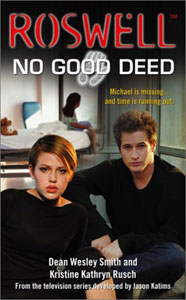Starting when Max heals Liz in the pilot episode, “Roswell” is a show about actions and consequences. The first tie-in novel,” “Loose Ends,” has fun with the question of “What if Liz ran into the guy who accidentally shot her?” But the second novel, Dean Wesley Smith and Kristine Kathryn Rusch’s “No Good Deed” (September 2001), is a more direct and robust sequel to a TV episode, in this case “A Roswell Christmas Carol” (2.10).
Season 2 is packed with storylines that don’t get resolved – actions that don’t reach their final consequence, so to speak – and while this is a problem with the season, it provides good fodder for the tie-in novels. In “No Good Deed,” scammers have seized upon Max’s “Christmas miracle” healing of a hospital ward of dying children. The scammers claim credit and mail fake serums to desperate parents for $15,000.
Max and company might want to deal with these scammers regardless, but they are propelled into action (or reaction, as it were) by two factors: Michael is kidnapped by a parent of a dying child, and a reporter visits Roswell to interview Brody, the father of the girl Max heals.
It’s difficult to have character arcs in tie-in novels since you can’t contradict what happens in the TV narrative, but the husband-and-wife authors give Michael a good one, building on his comment in “A Roswell Christmas Carol” – set three months before this novel — that he is angry because he can’t heal people like Max can. I didn’t realize I was reading such a good arc until the payoff, where we learn Michael can help people even without a healing superpower – he just has to do the right thing.
Another trick to writing good tie-in novels is to invent a new character who interacts with our heroes. Smith and Rusch give us Nila Spence, a reporter. One of “No Good Deed’s” best sequences is when she sits in the Crashdown Café, observing the teens. They are behaving in the way we’re familiar with – organizing in response to the latest crisis (Michael’s disappearance) – and using coded language in case someone overhears.
It’s entertaining to see this from Nila’s point of view. She has reason to eavesdrop, since local color can make a feature story better. But the main hook is that this is a rare perspective: Those extras in the Crashdown are usually décor, like the alien wall mural. But what if one of those people were to get involved in the story?
The authors get everyone’s personality right, and their portrayal of Michael’s messy apartment is highly amusing. But I especially enjoy their descriptions of Max, who has “very powerful eyes” (page 75) and “a strong gaze” (76). Nila is an experienced reporter but she’s not a superstar reporter. The strength Max projects throws her off her game, and from that point forward a battle of wills plays out.
They both want to expose the scammers, but Max has to make sure Nila doesn’t get evidence of his and his pod-mates’ alien nature and that she keeps any such speculations out of her story.

Interestingly, “No Good Deed” explores both the value of the teens using their alien powers for good and the value of being selective with their powers. This is a theme a theoretical Season 4 might’ve dug into. In a handful of cases, the gang uses their powers for entirely altruistic reasons – “A Roswell Christmas Carol” being the prime example – but mostly they use them to defend against personal threats. These threats are so prominent that we as viewers never feel the aliens are being selfish, but at the same time there’s always that notion that they could do so much good for humanity if allowed to do so.
While “No Good Deed,” unlike “Loose Ends,” does include Kyle, Jim and Tess, it’s mostly centered on Max and Michael. (Maria, Alex, Isabel, Jim and Kyle are off on a road trip looking for Michael that doesn’t amount to anything plot-wise. But it’s still a good illustration of how Maria fears for Michael’s safety.)
There’s a good undercurrent regarding Tess, based on our knowledge of what she’ll do soon after this story: rely on her powers so much that she accidentally kills a friend.
Max, with assistance from Tess’ mind-warping powers, plans to heal one last cancer-stricken child, but it turns out he doesn’t have to: Earth-based science comes through. So maybe there is something to the non-interference principle (or at least, the don’t-use-your-powers principle). Unfortunately, it’s a lesson lost on Tess.

